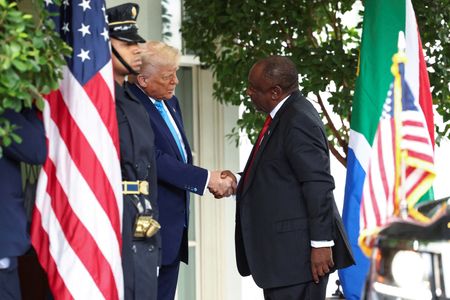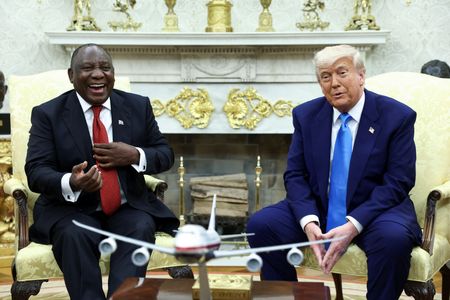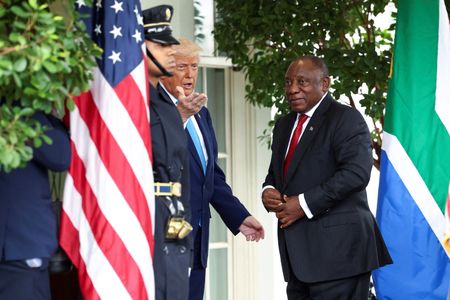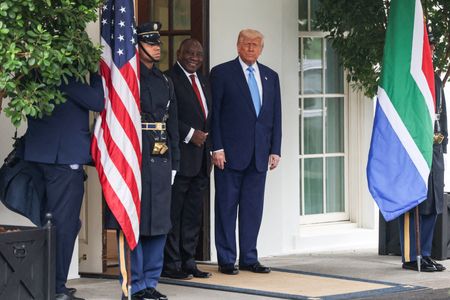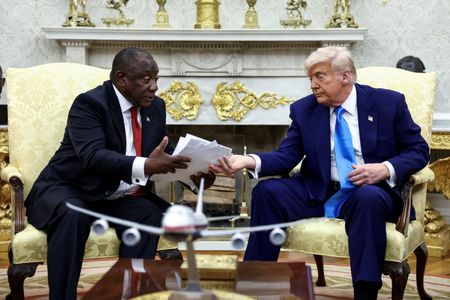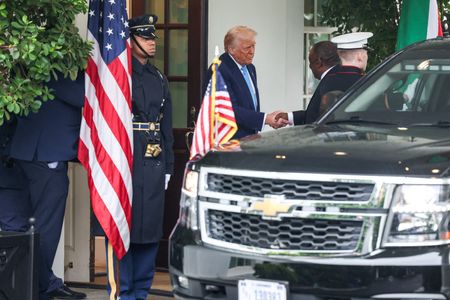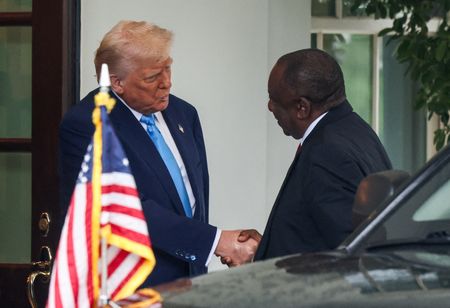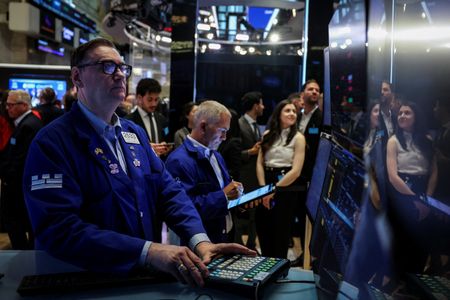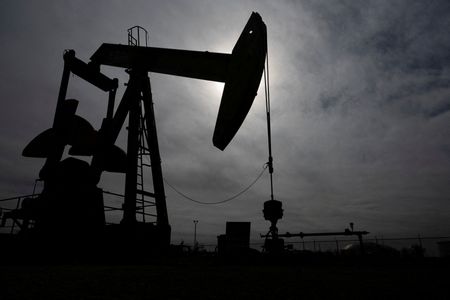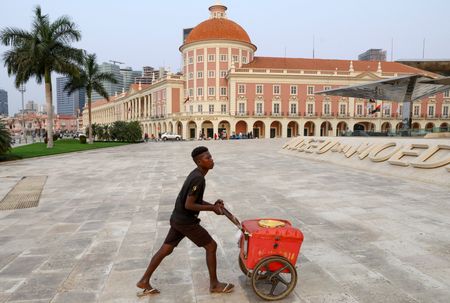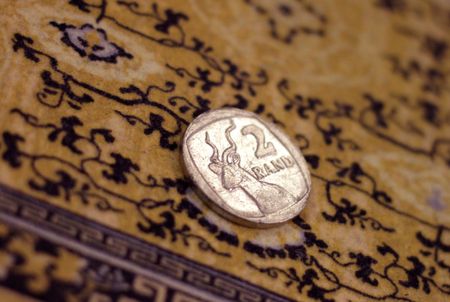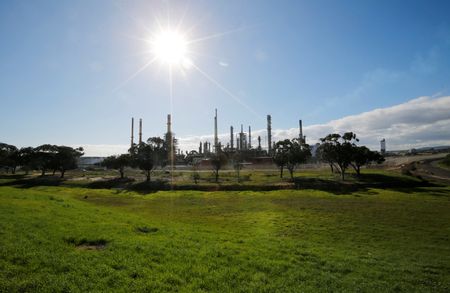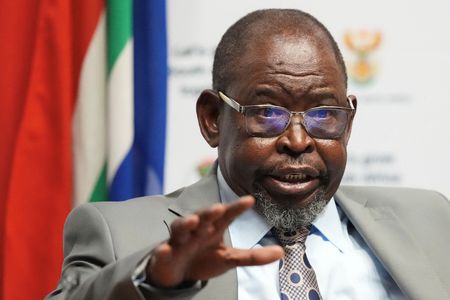By Nandita Bose and Jeff Mason
WASHINGTON (Reuters) -U.S. President Donald Trump confronted South African President Cyril Ramaphosa on Wednesday with explosive false claims of white “genocide” and unfair land seizures during a tense White House meeting that was reminiscent of his February ambush of Ukraine’s Volodymyr Zelenskiy.
Murder rates are high in South Africa, but the overwhelming majority of victims are Black.
Ramaphosa arrived prepared for an aggressive reception, bringing popular white South African golfers as part of his delegation and saying he wanted to discuss trade.
But in a carefully choreographed Oval Office onslaught, Trump pounced, moving quickly to a list of concerns about the treatment of whites, which he punctuated by playing a video and leafing through a stack of printed news articles that he said proved his allegations.
“We have many people that feel they’re being persecuted, and they’re coming to the United States. So we take from many … locations, if we feel there’s persecution or genocide going on,” Trump said, referring specifically to white farmers.
“People are fleeing South Africa for their own safety. Their land is being confiscated, and in many cases, they’re being killed.”
South Africa, which endured centuries of draconian discrimination against Black people during colonialism and apartheid before becoming a multi-party democracy in 1994 under Nelson Mandela, rejects Trump’s allegations.
A new land reform law, aimed at redressing the injustices of apartheid, allows for expropriations without compensation when in the public interest, for example if land is lying fallow. No such expropriation has taken place, and any order can be challenged in court.
Ramaphosa, sitting in a chair next to Trump and remaining poised, pushed back against his claims.
“If there was Afrikaner farmer genocide, I can bet you, these three gentleman would not be here,” Ramaphosa said, referring to golfers Ernie Els and Retief Goosen and billionaire Johann Rupert, who were present in the room.
That did not satisfy Trump.
“We have thousands of stories talking about it, and we have documentaries, we have news stories,” Trump said before directing that the video be played. “It has to be responded to.”
He then asked that the lights in the Oval Office be turned down. The video, played on a television that is not normally set up in the Oval Office, showed white crosses, which Trump said were the graves of white people, and opposition leaders making incendiary speeches. Trump suggested that one of them, Julius Malema, should be arrested.
LAND REFORM AND ISRAEL
Ramaphosa mostly sat expressionless during the presentation, occasionally craning his neck to look at the screen. He said he had not seen the material before and that he would like to find out the location.
Trump then displayed printed copies of articles that he said showed white South Africans who had been killed, saying “death, death” as he flipped through them, eventually handing them to his counterpart.
Ramaphosa said there was crime in South Africa, and the majority of victims were Black. Trump cut him off and said: “The farmers are not Black.”
Ramaphosa responded: “These are concerns we are willing to talk to you about.”
The South African president cited Mandela’s example as a peacemaker, but that did not move the U.S. president, whose political base includes white nationalists, either. The myth of white genocide in South Africa has become a rallying point for the far right in the United States and elsewhere.
“I will say: apartheid, terrible,” Trump noted. “This is sort of the opposite of apartheid.”
Unlike Zelenskiy, who sparred with Trump and Vice President JD Vance during their White House meeting and ended up leaving early, the South African leader kept his calm, praising Trump’s decor – the president has outfitted the Oval Office with gold accessories – and saying he looked forward to handing over the presidency of the Group of 20 next year.
Trump declined to say whether he would attend the G20 meeting in South Africa in November.
In recent months, Trump has criticized the land reform law and South Africa’s genocide court case against Israel.
He has canceled aid, expelled South Africa’s ambassador and offered refuge to white minority Afrikaners based on racial discrimination claims Pretoria says are baseless.
The United States is South Africa’s second-biggest bilateral trading partner after China. But the country is facing a 30% tariff under Trump’s currently suspended “Liberation Day” regime, and Ramaphosa was keen to discuss a trade deal and business opportunities.
Later in the meeting, South African business tycoon Johann Rupert, who was part of Ramaphosa’s delegation, stepped in to back up Ramaphosa, saying that crime was a problem across the board and many Black people were dying too.
He nodded to Elon Musk, Trump’s South Africa-born billionaire ally who was also present in the Oval Office, by saying that his Starlink telecoms systems were needed in every South African police station to combat crime.
(Reporting by Nandita Bose and Jeff Mason; Additional reporting by Nellie Peyton, Siyanda Mthethwa, Tim Cocks and Colleen Goko-Petzer in Johannesburg and Doina Chiacu, Trevor Hunnicutt and Daphne Psaledakis in Washington; Writing by Estelle Shirbon and Jeff Mason; Editing Joe Bavier, Don Durfee and Alistair Bell)

